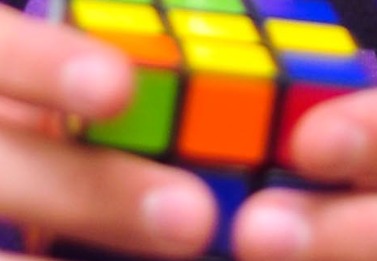 Sophomore Stefan Pedrazza takes solving Rubik’s cube to new heights
Sophomore Stefan Pedrazza takes solving Rubik’s cube to new heights
“First you want to go for a cross on a side,” sophomore Stefan Pedrazza says, as he deftly twists his hands. “Like this.”
He is looking up—not down—at the Rubik’s cube he was solving. As he spoke, he was accompanied by the almost rhythmic clicking of the cube’s mechanism. He was brief, because just as he finished talking, he finished solving, all in a span of about twenty seconds.
But by Pedrazza’s own standard, that’s slow.
On May 22, Pedrazza participated in the Annual Rubik’s Cube Competition at Stanford University, earning fourth place in the 3×3 Rubik’s cube category. His best solve time as posted on the competition website was 11.84 seconds. His personal best time is even faster—close to seven seconds. According to MVHS Rubik’s Cube Club adviser Joe Kim, his contest time itself is something to be proud of.
“Only about four years ago, the world record was ten or eleven seconds,” Kim said. “It’s astounding.”
Pedrazza was initiated into solving Rubik’s cubes in February of last year. Getting to where he is now, he says, has been no walk in the park.
“First you start off learning it slowly,” Pedrazza said, “then you practice by doing it alone.”
Last summer vacation, Pedrazza solved Rubik’s cubes anywhere from three hundred to five hundred times a day. According to Kim, each solve might have taken thirty seconds on average, meaning Pedrazza would have spent several hours a day with his Rubik’s cube. However, this much practice would not have been repetitive. According to Pedrazza, a Rubik’s cube can be scrambled in four quintillion ways, which means it can be solved in just as many.
Pedrazza acknowledges that Rubik’s cubing has helped him with his critical thinking skills and finger dexterity. However, just as the cube has kept his mind in shape, Pedrazza said the cube itself must be kept in shape as well. Most competitive Rubik’s cubers use high-quality cubes, keeping them well-lubricated with silicon-based sprays.
Pedrazza believes that the main reason why people are discouraged from Rubik’s cubing is that they think it involves too much math.
“It’s not really ,” Pedrazza said. “Although studies have shown that if you’re good at math, you’re good at this.”
In the future, Pedrazza intends to compete more actively in Rubik’s cube competitions and take his current hobby to higher levels. He does not intend to let other limitations box him in.








